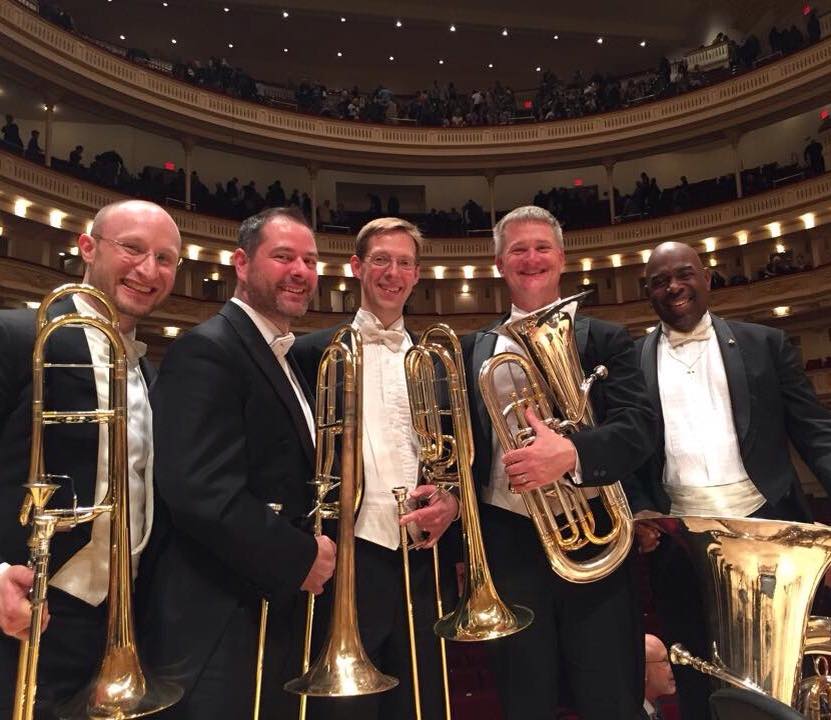From his home base of the Jacksonville Symphony, James Jenkins may launch into orchestral orbit of the famed Boston Symphony Orchestra or rocket to the vibrant Cleveland Symphony Orchestra. A prodigious performer and pedagogue, Jenkins was bit early on by the tuba bug in his home town Miami. There, Jenkins would go on to become one of the most outstanding graduates of the innovative tuba program at the university of Miami under master tubaist Connie Weldon. A virtuoso chamber music and orchestral stalwart, Jenkins also shines as a soloist and always seems to quickly adapt to any musical circumstance. “The Fourth Valve” tm is very excited to present James Jenkins….Enjoy!
1. What drew you to the tuba in the first place, and what has kept you
there?
I enjoyed the basic sound of the instrument and the function of the bass
lines. As I have grown in music, I appreciate the true versatility of the
instrument. I still really enjoy being the foundation or a part of the
foundation of the music. That’s where a lot of the musical substance is.
2. How would you describe Connie Weldon’s influence on the Tuba/Euph world?
On you, as her student?
Connie did a great deal for the music world through the Tuba, not least of
which was her establishing and helping to develop the concept to Tuba
Chamber Music in the U.S. As a teacher, she was fantastic. Very demanding
in a maternal way. Very focused on establishing solid, unshakeable
fundamentals and always remembering that even the etudes and exercises are
all music.
Weldon student, Sam Pilafian?
Many of us have been inspired in one way or another by Sam. From my
perspective, he’s taking the principals that Connie taught and brought them
to another level. A major creative mind!
4. How important has chamber music been to you as a musician, and how does
it affect your orchestral playing?
Of all that I do in musical performance, the skills that I developed through
learning to play chamber music have proven the most valuable. The ideals of
“being responsive and responsible to the other musicians on stage while I’m
playing”, “actively connecting with the other musicians”, “non-verbal
communication skills”, “understanding what my musical role is within the
ensemble at any particular time”, all of these ideals help me to be a much
better orchestral musician.
5. What do you look for in a tuba, and what have you found that you like?
I don’t have specific technical requirements for my instruments. I look
for instruments that are responsive to the way that I play (in all
registers), and helps me to get closer to the concept of sound that I have
in my head. I’m presently playing a 1925, BBb York as my main orchestral
instrument. I also own a Marzan, Holton 645, and a Yamaha 822 F-Tuba.

6. How have you seen the brass scene chsnge in the state of Florida since
you were a kid growing up in Miami?
Difficult to say, because mostly it has been my perspective that has changed.
There were great brass players around when I was a kid and there certainly
are now.
7. In addition to your regular position with the Jacksonville Symphony, you
have had the opportunity to perform with several notable orchestras. Ahat
stylistic and listening approaches have you noticed that are distinct
between Boston, Cleveland & Jacksonville? Similar?
The basic concepts are similar between the orchestras. There is much more
of a commitment to listening, and fine ensemble playing that happens in the
highest quality orchestras. Cleveland has an unparalleled commitment to the
Chamber Music Principals. They believe in precision ensemble, clarity and
transparency in the ensemble, dynamic range (especially soft), and perfect
intonation. Boston plays with glorious sounds and many colors. They also
play with a great deal of Power! In Jacksonville, we are working on
developing all of these things to be on a similar level of the Clevelands
and Bostons.
8. Who are your inspirations?
Musical-
I’m inspired by the Great Communicators and by people that I have seen grow
to great success. A few of my musical inspirations are: John Stevens,
Wynton Marsalis, Yoyo Ma, Ella Fitzgerald, Ray Charles, Demondrae Thurman,
and Mike Roylance.
Non-musical-
Those who are creative and determined to help make things better, or to
develop something interesting and beautiful. Too many people to name.
9. How do you approach teaching students differently today than you did
twenty years ago, and why?
Thanks to Connie Weldon and John Stevens, I’ve always taught the importance
of solid fundamentals, musical integrity, as well as creative, engaged
interpretation. I’ve always attempted to find a personal connection in
which to reach my students through. I continue to stress these things but I
now talk a lot about legacy. The honor of being connected with the greatest
music and musicians throughout history (all genres) through our work and
study that we engage in today. That it is important that we pursue our
study and development in a responsible, respectful manner, commiserate with
the musical legacy that we have connected to.
c. 2017 David William Brubeck All Rights Reserved www.davidbrubeck.com
Photos courtesy of James Jenkins
Do You Want More Interviews?
The Beastly Tubas of 2015! “The Fourth Valve” tm Recounts The Year’s Best Interviews…
How Sweet The Sound! The Tubas of 2014 on “The Fourth Valve” tm





